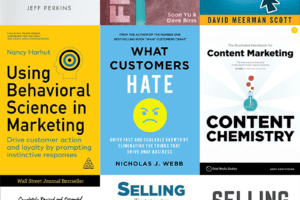Episode 57 of Yes, and Marketing
On this episode, Steve hears the best definition yet regarding what our improv-inspired podcast name really means.
Bob Kulhan is both a founder/member of world famous comedy ensemble Baby Wants Candy, and the CEO and founder of Business Improv, which brings corporate training combining improv and behavioral science to major brands like Google, Boeing, and Capital One.
In addition to explaining how he defines ‘yes and’ for businesses, Bob also covers the importance of curiosity, what it means to perform at the top of your intelligence, and why postponing judgment is such a valuable practice for any team collaboration.
Guest-at-a-Glance
???? Name: Bob Kulhan
???? What he does: Founder and CEO of Business Improv. Adjunct Professor at Duke Fuqua School of Business. Author, improvisor, and comedian.
????️ Find Bob on the web: Business Improv | Personal Website | LinkedIn
???? Get smart: “Improv isn’t making something up from nothing. It’s making it up from everything.”
Top Takeaways
A more valuable understanding of ‘yes and’ ????
Bob breaks down how they use “yes and” at Business Improv and how it might differ from the usual improv usage: “”Yes’ for us does not mean agreement. It does not mean I agree with you. It means I hear you. It means I’m taking time to listen to what you’re saying. I’m focusing, I’m present with you right now.”
‘And,’ then, is where you add your own perspective to the conversation. You bring your voice, while postponing judgment on both others’ ideas and your own.
“‘What ‘yes and’ can do,” Bob explains, “is allow you to start focusing on possibility and potential.” Rather than immediately focusing on ways an idea might not work, you stay open and engaged in the conversation to consider unexpected solutions and learn from new perspectives.
What it means to perform at the top of your intelligence ????
Bob recalls a reprimand he got from an improv veteran early in his career. “I was hosting a show and would often say, ‘We’re just making it up off the top of our heads!’ And he essentially grabbed me by the short hairs on my neck and said, ‘Don’t say that, because it dismisses the intelligence behind this. It dismisses the experience, it dismisses the knowledge.”
Far from pulling ideas out of nowhere, improv in fact requires the ability to pull ideas from everywhere—your environment, your experience, your education—and use them in real-time. And it’s a skill that is invaluable beyond the theater. “It’s using everything we have to the best of our ability,” Bob says, and it leads to more creative ideas and better problem solving in any field.
Episode Highlights
The Swiss army knife of communication
“‘Yes and’ is a way to be focused and present in the moment—a way to slow the brain down, so you’re not thinking about what you’re gonna say next. It is a way to postpone judgment and really show that you’re listening because you can’t build on what somebody else says if you’re not listening to them. So all of these core competencies related to communication get put front center with this Swiss army knife of a two word phrase: ‘Yes and.’”
What improv *really* is
“If we’re not just creating something out of nothing—just making it up off the top of our heads—then we’re using a skillset that’s very different than what people think about improvisation.
It’s a high level of awareness. It’s a high level of presence. It’s a high level of give and take, the ability to make initiations and back off at the same time as other people are making initiations, and it’s a high level of collaboration and spontaneity. So all of this, then, means that we’re performing at the top of our intelligence.”
The psychology of postponing judgment ????
“Postponing judgment is so important in the business world. It’s that ability to take off that critical-thinking hat and defer judgment to another time. To postpone judgment improvisationally is known as ‘suspending judgment.’ What we found, though, is that telling people to suspend judgment has a negative connotation. They start thinking, ‘Oh, my kid got suspended, so that’s a bad thing,’ as opposed to saying, ‘Be strategic. Can you postpone judgment? Can you defer it strategically to another period of time?’
Now all of a sudden they’re thinking toward that positive of, ‘Okay, I get to judge. I’ll judge sometime, just not right now.’”
How Business Improv works with companies
“Business Improv focuses on taking the tenets of improvisation that would otherwise be used to produce the outcome of comedy, and redirecting them to business. I’m an adjunct at Duke Fuqua as well as Columbia Business School and we work with Wharton and UCLA, so we have the opportunity to partner with thought leaders and professors in great spaces that do not inherently live on an improv stage, like behavioral psychology, cognitive psychology, social psychology, org theory, and behavioral economics.
We look at real-time, in-the-moment decision-making skills and apply them to things like leadership, communication, collaboration, brainstorming, creating cohesive teams, trusting teams, agility, adaptability, problem solving, conflict management—all these hard-to-reach outcomes. It’s all rooted in applicability: using these tools and techniques for real-world outcomes on an individual level, on an interpersonal level, on a team level.”
Curiosity is crucial ????
“Curiosity leads to being a student of life and wanting to know what’s gonna happen next and accepting the fact that I don’t even know the levels of bias, right? Otherwise you don’t know what you don’t know, so you just operate in the same bubble over and over again.
…Curiosity is so important as it relates to something like being vulnerable and accepting the fact that I don’t know and I should be open to it. Even as the CEO and founder of my own organization, I should be open to the unknown. I should be open to being wrong and having somebody tell me, ‘Hey, Emperor, you’re naked, put some clothes on already. You stink as well.’ —Okay, good. I didn’t know. I didn’t know I was naked. Somebody needs to call me out. And that to me is all based in that curiosity.”
Top Quotes
????️ Bob:
“Improv isn’t making something up from nothing. It’s making it up from everything.”
“Improv, at its core, is a communication and collaboration based art form.”
“Postponing judgment and using ‘yes and’ as a way to collect information and assess in real time what’s going on—it leads directly to curiosity.”
“Improvisers thrive in the unknown. Improvisers thrive in change.”



